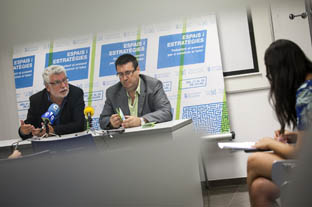
“Estrategias químicas para el progreso de la cocina” (Chemical strategies for the progress of cooking) and “Participación ciudadana y cambio de modelo político en la Comunitat Valenciana” (Citizens participation and change of the political model) are two courses of the 31st edition of the “Universitat d’Estiu de Gandia” (Gandias’ Summer University). Two of the people in charge, the full university professor Miguel de la Guardia and the professor Fernando Flores, respectively, have offered, this Wednesday, both lectures.
UV full university professors of Analytic Chemistry Salvador Garrigues and Miguel de la Guardia are responsible for coordinating the course “Estrategias químicas para el progreso de la cocina” (Chemical strategies for the progress of cooking). Throughout the course, students may learn new laboratory techniques through which new culinary recipes may be elaborated. According to Miguel de la Guardia, the purpose of this course is “to make known and take advantage of the tools that chemists use daily to modify the characteristics of food and which may mean a new business opportunity for restaurateurs”.
De la Guardia has introduced the haute cuisine as an added value which generates an industrial development, apart from attracting quality tourism. The full university professor of Chemistry has pointed out that “eating and cooking is also a social activity which is not only one-way” since it has a twofold aspect, he has said, in which professors teach their students those techniques but they expect to receive new ideas from students. Miguel de la Guardia has commented that the course attempts to be as enjoyable as possible, with a theoretical part, in where techniques are explained, and another practical part in which students carry out freeze-drying, rota-evaporation, centrifugation or ultrasounds.
For its part, Salvador Garrigues appointed the importance of the university as a place in where chemists and cooks may interact sharing a space which may be crucial for the creation and the innovation in both fields. Garrigues has regretted that in Spain “there are very few places in where research lines related to this task exist, and moreover are not universally accessible”.
Finally, Salvador Garrigues has concluded “we must make known the resources provided by the university and which are made available to all people interested in discovering these techniques which attempts to relate the technique with the idea”. The chemist has influenced in the importance of valuing the work of top Spanish chefs “who are contributing to make the Spanish brand known and who are contributingwith the great gastronomic tradition of this country”.
Citizens’ participation and change of political model
Fernando Flores is a tenured professor of Constitutional Law in The UV and coordinator pf the course ‘Participación ciudadana y cambio de modelo político en la Comunitat Valenciana’ (Citizens participation and change of the political model in the Valencian Community). In the course, the reality of the citizens’ participation has been mentioned in a retrospective and prospective way addressing the past, the present and the possible future of the citizens’ involvement in politics. Moreover, students have analysed different experiences carried out by associations such as “Salvem el Cabanyal” (Let’s Save the Cabanyal), ‘Plataforma Feminista de Alicante’ (Alicante’s Feminist Platform) or ‘#Ontinyentparticipa’ (Ontinyent takes part); those association have been the students’ models because of their influence in public opinion and in the political schedule.
As a good example of success of a social movement, the professor has explained the case of the Valencian neighbourhood “El Cabanyal” where the Valencian City Council wants to carry out a PEPRI (Plan for Internal Reform without Protection) through which a cultural National Interest such as this neighbourhood will be destroyed . “Thanks to the citizens’ movement “Salvem el Cabanyal” (Let’s Save El Cabanyal) and the citizens’ tenacity to stop the intentions of the Valencian Government, the justice has decided that the intention of the “Partido popular” (a Spanish right-winged political party) is illegal because it destroys historic heritage and, therefore, this party should rectify the foreseen plan for that area”, has raised Flores.
According to the title of the course, professor Flores has pointed out the importance of recalling how we slid into a crisis and how “citizens’ involvement is shaped as a fundamental element in the fight for a change, as long as this involvement goes hand in hand with the creation of new political parties, trade unions which actually fight for the workers’ rights, independent media, among others”. As the jurist has pointed out, “each time there are more people who are reacting before political proceedings and who are joining different social movements to defend their interests”. With this involvement, Flores considers that although not “at the level of making the government tremble, it is in fact being enough for the political parties to take measures and to adopt changes forced by the citizen movement”.
In response to the question of whether people agree with the motion by the Popular Party with regard to that the most voted list gets into the government, the professor of Constitutional Law has been forceful when responding that it is “a total democratic fraud directed towards not losing in the big cities”. Fernando Flores assured that this proposal cannot be negotiated one year after the local elections since “there are many elements that citizens should understand before excercising their rights to vote”.
Last update: 24 de july de 2014 08:08.
News release



















